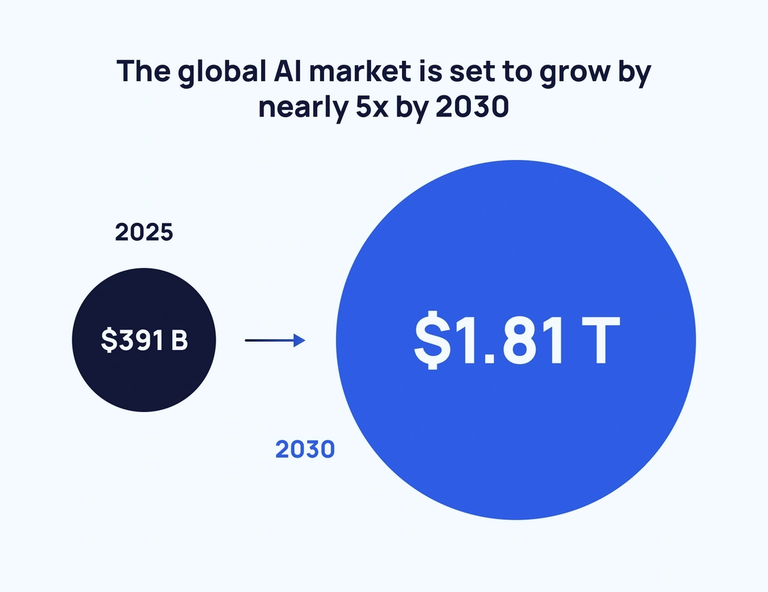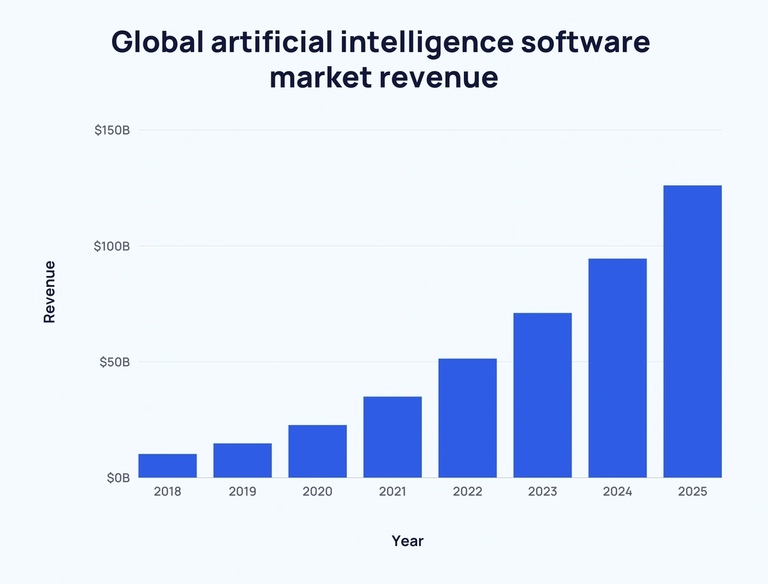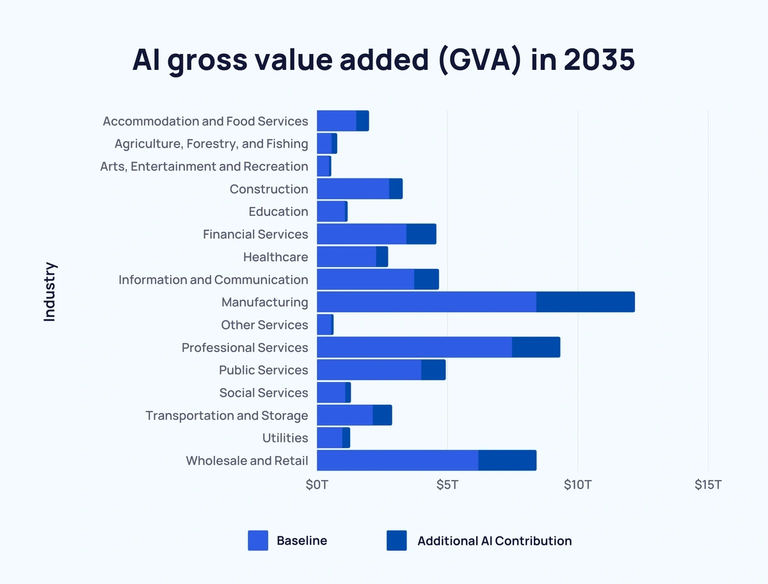AI Adoption: Growth and Impact of Artificial Intelligence in 2025
KEY FACTS: In 2025, the global AI market is valued at $747.91 billion, projected to soar to $2.74 trillion by 2032, with generative AI reaching $66.62 billion by year-end. Approximately 78% of global companies utilize AI, with 83% prioritizing it. Chatbots like Meta AI and ChatGPT engage nearly 1 billion users worldwide. AI is projected to create a net gain of 12 million jobs by 2025, employing 97 million people, though 82% of consumers distrust AI-generated content. Google's AI Overviews appear in 13.14% of search queries, disrupting SEO, while ethical concerns and the need for transparency highlight the challenges of AI's rapid integration into society.

Source: Exploding Topics
AI Adoption: Growth and Impact of Artificial Intelligence in 2025
The world of artificial intelligence (AI) is no longer a distant vision of science fiction but a transformative force reshaping industries, economies, and daily life. As of July 2025, AI's meteoric rise continues to accelerate, driven by advancements in generative AI, large language models (LLMs), and widespread adoption across businesses and consumer applications. A comprehensive report from Exploding Topics, a leading trend analysis platform, provides a detailed snapshot of the AI landscape, revealing staggering statistics and projections that underscore its profound influence. From market growth to job creation, consumer adoption to ethical concerns, the data paints a picture of a technology poised to redefine the global economy and society at large.
The global AI market is experiencing unprecedented growth, with its value reaching approximately $747.91 billion in 2025, a significant leap from $515.31 billion in 2023. Projections indicate that by 2032, the AI market could soar to $2.74 trillion, representing a fourfold increase from 2024's $621.19 billion. This growth trajectory, driven by a compound annual growth rate (CAGR) of 20.4% from 2022 to 2030, highlights AI's role as a cornerstone of technological innovation. In the United States alone, the AI market is valued at $73.98 billion in 2025, with an expected CAGR of 26.95% through 2031. The generative AI sector, fueled by tools like ChatGPT, is also booming, with a market value of $50 billion in 2024, up 54.7% from $29 billion in 2022, and expected to reach $66.62 billion by the end of 2025.

The AI software market's global annual revenue (2018 to 2025):
This economic surge is not limited to software. The wearable AI market, propelled by devices like the Apple Watch and Fitbits, is projected to reach $180 billion in 2025. By 2030, some estimates suggest AI could generate $15.7 trillion in revenue, boosting global GDP by an additional 26%. These figures reflect AI's ability to create value across diverse sectors, from entertainment and healthcare to finance and manufacturing.
AI has become a cornerstone of modern business strategy, with 78% of global companies reporting its use in at least one business function, and 71% leveraging generative AI specifically. This marks a significant shift from 2017, when only 20% of companies incorporated AI into their operations. By 2025, 83% of companies will consider AI a top priority, with 92% planning to increase investments over the next three years. Large organizations, particularly those with over 5,000 employees, are leading the charge, with over 50% of such firms adopting AI technologies. In contrast, smaller companies are adopting AI at half the rate, highlighting a disparity in access to resources and expertise.
AI's applications in business are vast. Customer service is the most common use case, with 56% of business owners utilizing AI for tasks like automated chatbots and personalized recommendations. For example, Netflix generates $1 billion annually from AI-driven personalized recommendations, showcasing the technology's ability to enhance customer experiences and drive revenue. Additionally, 35% of companies have turned to AI to address labor shortages, automating repetitive tasks to improve efficiency. By 2025, AI is expected to save employees an average of 2.5 hours per day, boosting productivity by up to 40% by 2035.
Geographically, India leads in AI deployment, with 59% of companies implementing the technology, followed by the United Arab Emirates (58%) and Singapore (53%). Surprisingly, the United States lags with only 33% adoption, possibly due to regulatory complexities or varying priorities across industries.
The Rise of Conversational AI
AI chatbots have become a ubiquitous feature of digital interactions, with over 987 million people using them globally in 2025. The global chatbot market is valued at $15.57 billion, a dramatic increase from $2.47 billion in 2021, and is projected to reach $46.64 billion by 2029. Meta AI leads with 500 million active users, followed by ChatGPT with 400 million. Other notable players include Google Gemini (140 million users), Microsoft Copilot (100 million), and Grok, which has rapidly grown to over 35 million active users.
ChatGPT, developed by OpenAI, remains a standout success story. Launched in November 2022, it reached 1 million users in just five days, surpassing the growth rates of platforms like Instagram (2.5 months) and Netflix (3.5 years). By January 2023, ChatGPT had 100 million monthly active users, and as of July 2025, its website receives 5.19 billion visits per month, ranking it the fifth most visited website globally. OpenAI aims to reach 1 billion users by the end of 2025, a goal that seems increasingly attainable given its current trajectory.
Consumers are embracing chatbots for various purposes. According to surveys, 35% use them as an alternative to search engines, 23% for writing or editing tasks, and 17% for generating ideas for work or school. Businesses report a 67% average increase in sales from chatbot interactions, with 26% of sales originating from these tools. The cost to develop and implement a chatbot varies widely, ranging from $5,000 to $500,000, depending on complexity and industry.

Source: Exploding Topics
Opportunities and Challenges
AI's impact on the job market is a double-edged sword. By the end of 2025, an estimated 97 million people will work in the AI sector, driven by the need for skilled professionals to develop, deploy, and maintain AI systems. However, AI is also poised to disrupt traditional roles. The Bureau of Labor Statistics projects that just under 10% of jobs could be at risk of automation by 2029, particularly in fields like writing, photography, and software development, where generative AI tools excel. Despite these risks, AI is expected to create 97 million new jobs by 2025, outpacing the 85 million jobs it may eliminate, resulting in a net gain of 12 million jobs.
Worker sentiment is mixed. While 52% of workers express concern about AI's impact on their roles, only 29% feel excited, and 33% feel overwhelmed. Younger workers, workers of color, and those earning lower wages are particularly worried, with 18- to 24-year-olds 129% more likely than those over 65 to fear job obsolescence. Training is a critical factor, with many workers concerned about inadequate preparation for using AI tools effectively. Larger companies are prioritizing AI training, particularly in industries like IT, media, entertainment, telecommunications, and electronics.
Interestingly, attitudes toward AI in the workplace vary by region. In the U.S., 15% of workers are open to having an AI boss, compared to just 8% in the UK. However, concerns about AI undermining work ethic persist, with some workers fearing that reliance on AI could lead to perceptions of laziness, potentially affecting career advancement.
Consumer Trust and Ethical Concerns
Despite AI's widespread adoption, trust remains a significant hurdle. An Exploding Topics survey of over 1,000 web users found that 82% are skeptical of AI-generated content, with 42.1% encountering inaccurate or misleading information in AI Overviews. Only 18.6% consistently verify AI sources, indicating a reliance on convenience over accuracy. While 70.62% of users believe Google’s AI Overviews have either maintained or improved search quality, 21.6% think AI has worsened search experiences. Additionally, 48.12% want less AI-generated content online, reflecting a desire for more human-curated information.
Gender and regional differences also shape attitudes. Women are less likely to engage with AI-generated content (55.57% vs. 42.54% for men), and regions like the West North Central show greater skepticism, with 57.45% less likely to engage with AI-labeled content. In contrast, the Mid-Atlantic is more receptive, with 34.72% more likely to engage. These findings highlight the complex relationship between convenience, trust, and AI adoption.
SEO and Search: AI's Disruption of the Digital Landscape
AI is reshaping the search engine optimization (SEO) landscape, with Google's AI Overviews appearing in 13.14% of queries in March 2025, up from 6.49% in January. Informational queries are most likely to trigger AI Overviews (88.1%), while commercial and transactional keywords have a lower presence (10%). This shift has pushed organic results further down the page, occupying 42% of desktop screens and 48% of mobile screens, contributing to reported traffic losses for many websites.
Despite early predictions that generative AI would erode Google's dominance, the search giant retains over 90% market share, processing 14 billion searches daily compared to ChatGPT's 37.5 million. However, AI-driven search traffic is projected to surpass organic search by 2028, signaling a long-term shift. For marketers, optimizing for AI Overviews is becoming critical, with 80% of SEO professionals emphasizing link-building and high-quality content to maintain visibility.
The AI revolution is in full swing, with 2025 marking a pivotal moment in its ascent. From a multi-billion-dollar market to widespread business adoption, job creation, and consumer engagement, AI is reshaping the global landscape. Yet, as the technology advances, so do the challenges of trust, ethics, and equitable access.
Information Sources:

If you found the article interesting or helpful, please hit the upvote button and share for visibility to other hive friends to see. More importantly, drop a comment below. Thank you!
This post was created via INLEO. What is INLEO?
INLEO's mission is to build a sustainable creator economy that is centered around digital ownership, tokenization, and communities. It's built on Hive, with linkages to BSC, ETH, and Polygon blockchains. The flagship application, Inleo.io, allows users and creators to engage & share micro and long-form content on the Hive blockchain while earning cryptocurrency rewards.
Let's Connect
Hive: inleo.io/profile/uyobong/blog
Twitter: https://twitter.com/Uyobong3
Discord: uyobong#5966
Posted Using INLEO
https://www.reddit.com/r/artificial/comments/1m1chcp/ai_adoption_growth_and_impact_of_artificial/
This post has been shared on Reddit by @tsnaks through the HivePosh initiative.